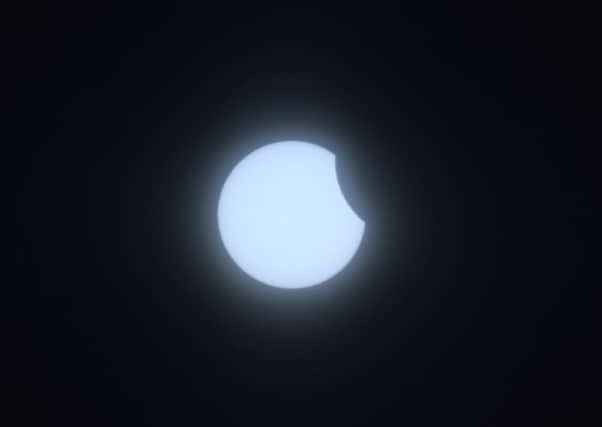See the Solar Eclipse safely with a home-made pinhole projector


Anyone looking to take science into their own hands has a perfect opportunity to do so this morning (Friday, March 20) when the Solar Eclipse takes place.
One of the easiest and safest ways to view the Sun – eclipsed and uneclipsed – is to project its image on a screen using a pinhole camera or a pinhole projector. You can make one using common household items.
Advertisement
Hide AdAdvertisement
Hide AdYou will need two sheets of plain white paper - printer paper is ideal or, two pieces of stiff white paper or white cardboard and for the pinhole, a thumbtack or a sharp pin.
To make a quick version of the pinhole projector, take a sheet of paper and make a very small hole in the middle of it using a pin or a thumbtack. Make sure that the hole is round and smooth.
Hold this piece of paper in front of the Sun and do not look at the Sun directly.
Never look at the Sun directly without protective eye gear. Even sunglasses cannot protect your eyes from the damage the Sun’s rays can do to them.
Advertisement
Hide AdAdvertisement
Hide AdThe second sheet of paper will act as a screen. Hold it at a distance so that an inverted image of the Sun is projected on it through the pinhole.
To make the image of the Sun larger, move the screen away from the pinholed sheet.
Do not look at the Sun through the pinhole or through the paper. When using this kind of projector, your back must be towards the Sun.
You can also see the eclipse though a box pinhole projector.
Advertisement
Hide AdAdvertisement
Hide AdThis device works on the same principle as the basic one, except it is much sturdier, easier to set on a surface and requires a few extra items to construct.
You will need:
A long cardboard box or tube. Any shipping box will do. If you don’t have a long box, you can tape two together to make one long box. The length of the box will determine the image size - the longer the box, the larger the image. Also required, Scissors, Duct tape, aluminium foil, pin/thumbtack, sharp knife or cutter (kids best have an adult at hand) and last but not least, a sheet of white paper.
Cut a rectangular hole on one end of the box using the sharp knife.
Using the scissors, cut an equally-sized rectangular piece of the aluminium foil. Make sure it is not crinkled.
Advertisement
Hide AdAdvertisement
Hide AdTape the foil over the rectangular hole you just made in the box.
Use the pin to poke a hole in the center of the foil.
Place or tape the sheet of paper at the other end of the box.
Stand with your back towards the Sun. Place the box on your head with the hole towards the Sun. Adjust your position without looking at the Sun directly or through the pinhole until you see the Sun’s image on the paper.
Using a tube? If you are using a tube or taping two tubes together, cut the end of the tubes and tape the foil with a pinhole on one end. On the other end, tape a piece of white paper that has been cut to the shape and size of the end of the tube. This will act as the screen. Close to this end, cut a rectangular hole using the sharp knife. This will be your viewing window. With your back to the Sun, point the end with the aluminium foil towards the Sun. Look through the viewing window and you will see the eclipse on the screen.
Now, a few important things to remember.
Advertisement
Hide AdAdvertisement
Hide AdNever look at the Sun directly without protective eye gear. Even sunglasses cannot protect your eyes from the damage the Sun’s rays can do to them.
Do not look at the Sun through the pinhole. Always keep your back towards the Sun while looking at a pinhole or a binocular projection.